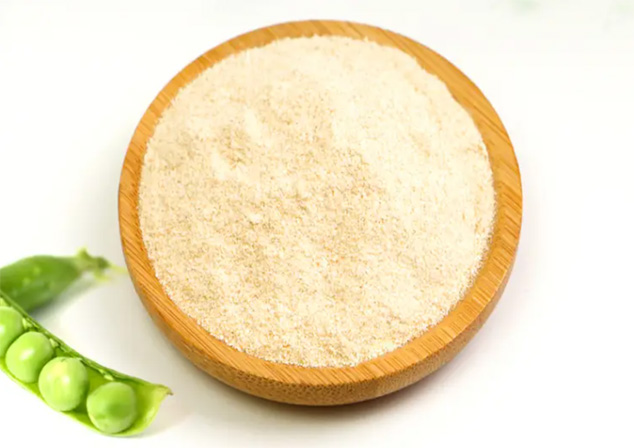Pea protein powder is a high-purity protein extracted from peas using low-temperature and low-pressure techniques. Like soy protein, pea protein powder contains all the essential amino acids, making it a complete protein and a good choice for vegetarians.

In addition, pea protein is less likely to cause allergies compared to soy protein and does not commonly cause bloating. If soy protein is not well-tolerated, pea protein is an excellent alternative. Common pea protein products on the market often use yellow pea protein, which has the highest protein content ratio.
Besides providing rich protein, raw organic pea protein powder also has the following two major benefits:
Weight Management: Like soy protein, pea protein can increase satiety and reduce appetite, helping with weight management as a meal replacement.
Antioxidant Properties: Rich in vitamin E, pea protein offers antioxidant effects and promotes metabolism, beneficial for beauty and skincare.
Protein Content in Peas and Soybeans: Both contain plant protein, with about 20g of protein per 100g in peas and approximately 35.1g of protein per 100g in soybeans. Thus, soybeans have a higher protein content than peas.
Soy protein powder is a protein product made from soybeans. It is processed by defatting and removing some carbohydrates. Depending on the protein content, soy protein powder is divided into three types:
Soy Flour: About 50-65% protein content.
Soy Protein Concentrate: About 65-90% protein content.
Soy Protein Isolate: With over 90% protein content, it's the purest form of soy protein and is free from soybean trypsin inhibitors, preventing issues like indigestion and bloating.
Although plant-based, soy protein's amino acid composition is similar to milk protein, making it a rich and complete nutritional protein, one of the most nutritious plant proteins. However, many food products containing hydrolyzed soy protein are just part of the amino acids from soy protein and are not equivalent to the whole soy protein, offering lower nutritional value.
Soy protein powder not only provides essential protein nutrition but also has the following four major benefits:
Satiety: Protein provides a higher sense of fullness than carbohydrates, and soy protein, low in fats and carbohydrates, does not cause sudden spikes in blood sugar and helps suppress appetite.
Reduced Blood Clot Formation: Rich in linoleic acid and flavonoids, soy protein powder has little cholesterol.
Rich in Lecithin: Contains abundant lecithin.
Plant Estrogens: Contains plant estrogens structurally similar to human estrogen, beneficial for women.
Which is Better, Pea Protein or Soy
Protein or Soy Protein: Pea protein and soy protein each have their benefits. Soy protein is known for its strong satiety, prevention of blood clot formation, cholesterol reduction, and estrogen supplementation, while pea protein is known for its weight loss and antioxidant effects. Individuals can choose based on their needs.
3. Can People Allergic to Soybeans Eat Peas?: Whether someone allergic to soybeans can eat peas depends on the specifics of their allergy. If the allergy is to protein, it's best to avoid peas. Otherwise, an allergen test is recommended before consuming peas.
Can Peas and Soybeans Be Eaten Together?: Peas and soybeans can be consumed together. They do not have conflicting nutritional components, but both being legumes, should not be eaten in large amounts to avoid bloating and abdominal pain.
In summary, soy protein and pea protein powder are both complete proteins containing essential amino acids and are excellent choices among plant proteins. Pea protein powder is particularly suitable for vegetarians, fitness enthusiasts, lactose-intolerant individuals, and the elderly.